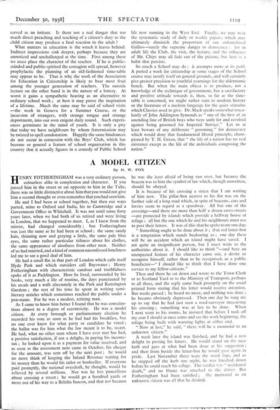A MODEL CITIZEN
By H. W. FOX
HENRY FOTHERINGHAM was a very ordinary person, colourless alike in complexion and character. If you passed him in the street or sat opposite to him in the Tube, there was so little distinctive about him that you would not give him a second thought or even remember that you had seen him.
He and I had been at school together, but then our ways parted, mine to Oxford and India, his to Cambridge and a Government Office in Whitehall. It was not until some forty years later, when we had both of us retired and were living in London, that we happened to meet. I, as I knew from the mirror, had changed considerably ; but Fotheringham was just the same as he had been at school ; the same sandy hair, thinning now and greying a little, the same pale blue eyes, the same rather particular tidiness about his clothes, the same appearance of aloofness from other men. Neither of us had married, and a kind of common unconfessed loneliness led me to see a good deal of him.
He had a small flat in that part of London which calls itself Hyde Park and which outsiders call Bayswater ; Henry Fotheringham with characteristic candour and truthfulness spoke of it as Paddington. Here he lived, surrounded by his books, very much a life of routine, the days punctuated by his meals and a walk alternately in the Park and Kensington Gardens ; the rest of his time he spent in writing semi- literary articles which sometimes reached the public under a pen-name. For he was a modest, retiring man.
As I came to know him better I found that he was conscien- tious almost to a degree of eccentricity. He was a model citizen. At every borough or parliamentary election he recorded his vote as soon as he had had his breakfast, but no one ever knew for what party or candidate he voted ; the ballot was for him what the law meant it to be, secret. He had, what no other man whom I have ever met has had, a positive satisfaction, if not a delight, in paying his income- tax ; he looked upon it as a payment for value received, and as soon as the assessment note came in October, his cheque for the amount, was sent off by the next post ; he would no more think of keeping the Inland Revenue waiting for its money than he would his tailor or bookseller. If everyone paid promptly, the national overdraft, he thought, would be relieved by several millions. Nor was he less punctilious about crossing a street ; he would go a hundred yards or more out of his way to a Belisha beacon, and that not because he was the least afraid of being run over, but because the beacon was to him the symbol of law which, though unwritten, should be obeyed.
It is because of his crossing a street that I am writing of him now. The pillar-box nearest to his flat was on the further side of a long road which, in spite of beacons, cars and lorries seem to regard as a speedway. All but one of the crossings—and there are more than half a dozen cross-streets —are protected by islands which provide a halfway house of refuge ; all but the one which he and his neighbours must use to post their letters. It was of this that he spoke to me one days "Something ought to be done about it ; that red letter-box is a temptation which stands beckoning us ; one day there will be an accident which an island might have saved. I am quite an insignificant person, but I must write to the authorities about it. I should like to think "—and here an unexpected feature of his character came out, a desire to recognise himself, rather than to be recognised, as a public benefactor—" I should like to think that I have done one service to my fellow-citizens."
Then and there he sat down and wrote to the Town Clerk or to Scotland Yard or to the Ministry of Transport, perhaps to all three, and the reply came back promptly on the usual printed form stating that his letter would receive attention. But weeks passed ; he heard no more, and nothing was done ; he became obviously depressed. Then one day he rang me up to say that he had just seen a road-surveyor measuring his crossing ; something was at last to be done. When I next went to his rooms, he insisted that before I took off my coat I should at once come and see the work beginning, the refuge being built with warning lights at either end.
"Now at last," he said, " there will be a memorial to an unknown citizen."
A week later the island was finished, and he had a new delight in posting his letters. He would stand on the near kerb and gaze at what had been done at his suggestion ; and then from beside the letter-box he would gaze again in pride. Last November there were the usual fogs, and as he stepped off the kerb one night, he was knocked down before he could reach his refuge. The verdict was" accidental death," and no blame was attached to the driver. But Fotheringham had been satisfied ; the memorial to an unknown citizen was all that he desired.


































 Previous page
Previous page